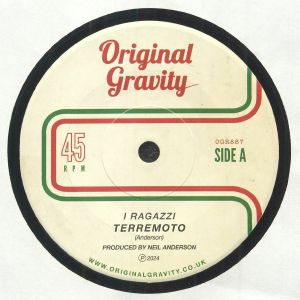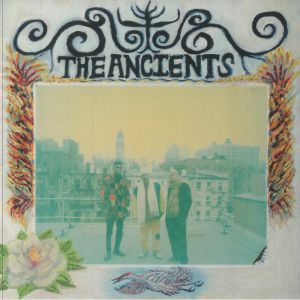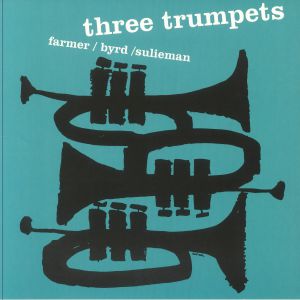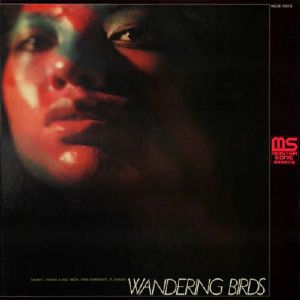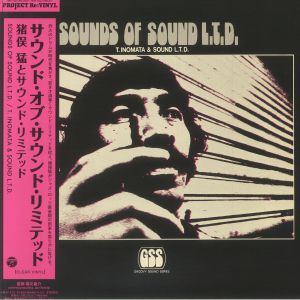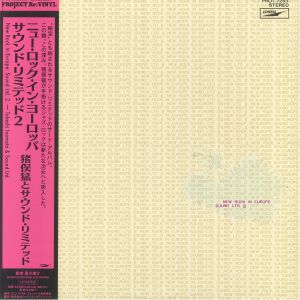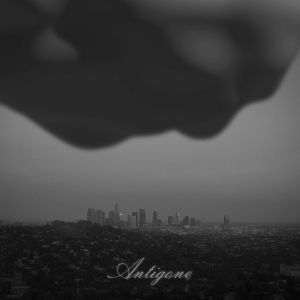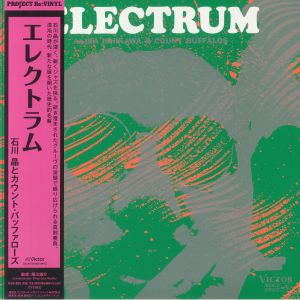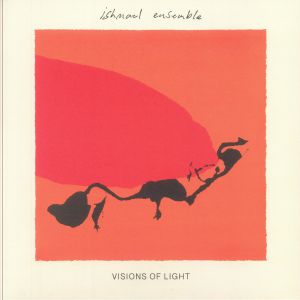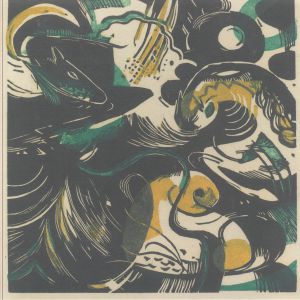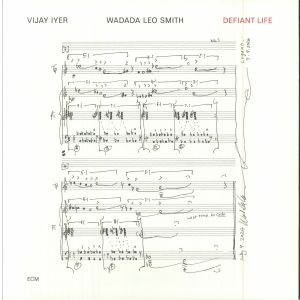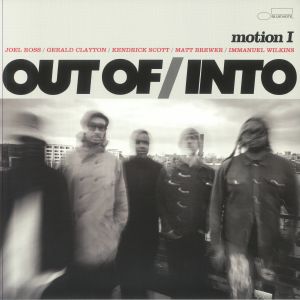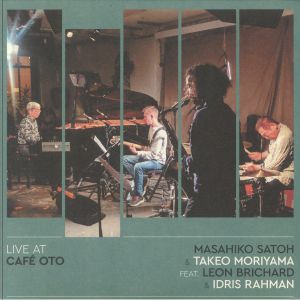Back catalogue: All genres
Juno's full catalogue of All genres
Singles
Review: Original Gravity strides into 2025 with this electrifying debut release from I Ragazzi. The limited 45 rpm has been crafted by the talented Neil Anderson and the title cut 'Terremoto' on the A-side bursts with funky, soulful energy that promises to keep floors moving and grooving all night long. It has big drums, crashing hits and driving Hammond organ stabs that never let up. On the flip, things get a little more laid back with 'Via Appia' which is led by more great organs, this time with swirling horn sounds and an inviting rhythm.
… Read moreGespielt von: Craig Charles Funk And Soul
in stock $14.13
Alben
Review: The debut recording from The Ancients, an intergenerational trio featuring Isaiah Collier, William Hooker and William Parker initially formed to play Milford Graves' Mind Body Deal exhibition at the Institute of Contemporary Art in Los Angeles. This double LP captures the raw energy and improvisational brilliance of their live performances, showcasing the enduring legacy of free jazz. Collier's tenor saxophone soars and wails, drawing on influences from John Coltrane to Charles Gayle, while grounding his explorations in a deep understanding of structure and form. Hooker's drumming is a force of nature, a whirlwind of polyrhythms and explosive energy that pushes the music to its limits. And Parker, a true legend of the avant-garde, anchors the music with his virtuosic bass playing, creating a foundation for the trio's improvisational flights. The music is both a celebration of the rich history of free jazz and a bold exploration of new sonic territory. The Ancients tap into the spirit of their predecessors, channeling the energy of the Cecil Taylor Unit and the Ornette Coleman Trio, while forging their own unique path, the power of collective improvisation looming large throughout.
… Read moreGespielt von: Juno Recommends Jazz
in stock $40.97
Cat: HONEY 097. Rel: 31 Jul 24
Jazz
Review: Three Trumpets was recorded in 1957 and released on the New Jazz label. It features the Prestige All Stars led by revered trumpeters Art Farmer, Donald Byrd, and Idrees Sulieman and supported by a solid rhythm section of pianist Hod O'Brien, bassist Addison Farmer, and drummer Ed Thigpen. This sublime album includes five original compositions, one each by Farmer, Byrd, and O'Brien, and two by Sulieman. While none of the tracks became hits in their own right and with 'Palm Court Alley' being a blues delight, they all offer up dynamic performances and impressive interplay among the brass musicians.
… Read more in stock $22.59
Review: Marking its debut on vinyl, Jiro Inagaki's groundbreaking jazz-rock album introduces a bold fusion of new rock elements, featuring Inagaki's vocals alongside Sammy and Yasushi Sawada for the first time. Backed by a stellar lineup including Masahiko Sato, Kimio Mizutani, and Hiro Yanagida, this reissue by Nipponophone underlines Inagaki's status as a maverick in Japanese jazz. Originally released in 1971, the album blends heavy rock grooves with an enigmatic allure, resonating deeply with collectors of rare groove worldwide. Inagaki, renowned for his saxophone work and production skills, has left an indelible mark not only in jazz but also as a sought-after session player for legends like Stevie Wonder and Frank Sinatra. This reissue reaffirms his legacy, offering a glimpse into his influential jazz-rock era.
… Read more in stock $44.64
Jiro INAGAKI / VARIOUS
Funky Best (remastered) (limited heavyweight vinyl LP with obi-strip)
Cat: CNLP 82. Rel: 04 Sep 24
Funk
Review: Japan meets funky disco in an explosive fusion led by maestro Jiro Inagaki here on a classic album that gets a worthy reissue. In a particularly inspired year during which he also released Funky Stuff on Nippon Columbia, Inagaki masterfully reinterprets tracks by Quincy Jones, Commodores, Graham Central Station, B.T. Express, Kool and The Gang, Stevie Wonder, Sly and The Family Stone, Ohio Players, Ripple, and Billy Preston on this one. He does so in collaboration with Hiromasa Suzuki, a prominent name in Japanese jazz, and seasoned session musicians who add their own spice. Inagaki brings a fresh, danceable sound here with a broad mix of inspirations from jazz to city pop all shining through.
… Read moreGespielt von: Juno Recommends Funk
in stock $35.88
Drum Method (reissue) (gatefold translucent yellow vinyl LP + insert with obi-strip)
Cat: HMJY 218. Rel: 29 Jan 25
Jazz
Review: Takeshi Inomata's Drum Method reissue is jazz-rock at its fiercest, transforming a drum instructional into a relentless groove machine. Inomata's legendary, boundary-pushing stick work shines, leading Sound Limited through a heady mix of originals and covers like 'Runaway Child' and 'Smack Water Jack.' The album, filled with dizzying solos and Norio Maeda's standout arrangements, is a masterclass in rhythm and energy, showing Inomata's unstoppable drive to reshape the genre. This reissue is pure, high-octane funk and groove at its finest.
… Read more in stock $49.16
Review: Takeshi Inomata is a pioneering drummer in Japan's jazz scene who launched the band Sound Limited in the late 1960s and set to work blending jazz and rock in a vibrant new direction. Influenced by the brass rock movement, Inomata sought to create music full of energy and free from the constraints of modern jazz. He brought together young, talented musicians to play with vitality and envisioned a large-scale sound. Their debut album, The Sound of Sounds LTD back in 1970, became a classic filled with dynamic performances, including the iconic 'Theme~Mustache,' a track that continues to define the band's legacy.
… Read more in stock $43.79
Review: Japanese jazz drummer Takeshi Inomata is a little-spoken-about figure in the jazz-rock scene; The Japan Jazz All Stars alumn, We 3 trio leader and Rhythm Clinic Center founder has made well over 300 recordings in his career - this being the third in a year-long trilogy enthusiastically and successively released under the Sound Limited name alongside Kimio Mizutani and Shigenori Kamiya - amongst others - largely influenced by European musicians like Donovan and The Beatles. A notable and funny inclusion is 'London Bridge is Falling Down', a quite literal jazz groove cover interpolating the famous nursery rhyme. Opening track 'Something' is a cracking piece of relaxing jazz, nothing eye-popping, just some glossy, well-played, easy listening. 'Hurdy Gurdy Man' is a fast-paced funk cut with striking psychedelic guitars over a frantic flute line - the project showed Inomata's vision for a more approachable and instantly catchy jazz rock that still retained a lot of character and left, evidently, lots of room for experimentation.
… Read more in stock $43.79
Review: A whole bunch of Weldon Irvine albums are being remastered and reissued at the moment, which will be music to the ears of spiritual jazz fans - literally. The American composer and pianists was one of the big names of his time and reals don labels like RCA and Strata-East as well as his own label. Young Gifted & Broke has never been on vinyl before as the recordings were only discovered in the early 2010s. It was a musical that was released in 1977 and inspired by the Black Civil Rights anthem 'Young, Gifted and Black,' which Weldon had written with Nina Simone. Talents like Marcus Miller joined the recordings which as can now be heard are magnificent to say the least.
… Read moreGespielt von: Juno Recommends Jazz, Charlie bucket/ dancing in space
in stock $33.33
Review: Isao Suzuki's follow-up to his breakthrough album captures the essence of Japanese jazz in the 1970s, a period where the traditional swing style was redefined with a unique, more restrained approach. This album features exceptional interplay between Suzuki and saxophonist Kazumi Watanabe, with an added depth from pianist Kunihiko Sugano and drummer Tetsujiroh Obara. Notably, bassist Nobuyoshi Ino joins on two tracks, including a stirring rendition of 'Body and Soul', bringing a fuller sound to the ensemble and highlighting Suzuki's innovative use of the cello within the small group context. The music, originally released in 1974, avoids the dated, overly rigid patterns of some American jazz of the time, instead opting for more fluid and expressive forms. Reissued now, this album stands as an essential masterpiece in the Japanese jazz canon, showcasing Suzuki's ability to create timeless, intricate and captivating jazz that continues to resonate with audiences worldwide.
… Read more in stock $44.93
Review: Eiko Ishibashi, best known for her acclaimed soundtrack work, returns to original composition with this album named in honour of the feminist-facing, heroine from ancient Greek tragedelian Sophocles' Oedipus Trilogy. It's a world of shimmering jazz harmonies, pulsating electronica and ghostly musique concrete, 'October' opening with a haunting, alluring melody and the disjointed rhythms of 'Coma' creating a sense of disorientation. 'Antigone', the centerpiece, builds to a powerful and unsettling climax, but there's more than chilling soundscapes as Ishibashi injects moments of surprising warmth and beauty, like the delicate interplay between acoustic and electronic elements in 'Nothing As'. Comparisons with her soundtrack work will be made, but - not unlike Antigone herself - this stands alone as a work of bravery and strength.
… Read more in stock $28.82
Review: In 1997, You Ishihara - a key figure in the of history of Japanese underground music, mainly thanks to his output as the leader of the band White Heaven - released this beauty. It's his debut solo album and in terms of the attention it received at the time, you might describe it as nothing more than a damp squib. Subsequently, it's only been availble on CD. However, for the first time on vinyl and to coincide with growing recognition that this is an album that's been unfairly lost in the cultural zeitgeist, it's now getting its flowers. Ishihara has a voice that lets those 60s melodies unfurl with the majesty of a flower opening its petals after a long winter. But he can also ramp it up to 13th Floor Elevator-esque psychedelic scuzz brilliance: 'Crevice' is all flailing hair, drum fills and beer spills. A lot of fun to balance out his Lou Reed-esque downtempo stuff.
… Read more in stock $40.67
Review: In 1970, Akira Ishikawa, a key figure in the jazz rock movement, ventured into bold new territory with his album Electrum. This ambitious project shows his innovative spirit, pushing jazz boundaries with its intense, precise grooves and the musicians' quest for new heights. The album features standout tracks like the tempestuous 'Electrum,' the complexly layered 'Revulsion,' and the tranquil 'Speak Under My Breath,' which captures the serene clarity of dawn. The presence of distinguished pianists and arrangers Masahiko Sato and Hiromasa Suzuki adds further depth and brilliance to this already vibrant work. Electrum is celebrated as a major achievement in Ishikawa's career and is a notable highlight within the Victor "Japanese Jazz" series. Its revival brings renewed attention to Ishikawa's groundbreaking exploration of jazz fusion.
… Read more in stock $51.98
Review: Bristol's Ishmael Ensemble returns with Visions of Light, an album that nicely shows the evolution of this experimental jazz collective led by producer and saxophonist Pete Cunningham. Following their acclaimed 2019 debut, A State of Flow, this record pushes boundaries further, blending lush, cinematic jazz with Bristol's signature dub and electronic influences. The album begins with the delicate harp glissandos of 'Feather,' drawing the listener into a serene yet deceptive calm. This tranquility is shattered by the high-energy, chaotic 'Wax Werk,' where the music takes on a darker, more intense character. Throughout Visions of Light, Cunningham's saxophone performances are bold and assured, layered over the dynamic contributions of collaborators like guitarist Stephen Mullins, drummer Rory O'Gorman, and synth maestro Jake Spurgeon. Side-2 offers a shift in tone, beginning with the vibrant 'Looking Glass,' featuring enchanting vocals and strings. The nostalgic 'Morning Chorus' and the ethereal 'The Gift' build towards the hopeful resolution of 'January.' This album is deliver's an emotionally resonant journey that transcends traditional jazz boundaries. Visions of Light is both a bold statement and a beacon of hope in challenging times.
… Read more in stock $29.10
Review: Ishmael Ensemble's third album, Rituals, marks a major evolution for the Bristol-based group. While often associated with the 'new UK jazz' scene, their fusion of live instrumentation and electronic elements extends far beyond that label in truth and now this release pushes their sound further than ever. It blends spiritual jazz, dub, experimental, and electronic styles into powerful, swirling soundscapes that work as well on the head as they do heel. The tracks are more notably song-focused and accessible but still deal in a psychedelic mix of textures, colours, and moods. Rituals is a truly boundary-pushing work of great ambition and is this vital group's best work to date.
… Read moreGespielt von: Juno Recommends Broken Beat Nu Jazz
in stock $28.25
Review: Watarase: Voice is a fantastic second release in this series following Fumio Itabashi's acclaimed Watarase: Echo. This new compilation serves up vocal versions of the masterpiece 'Watarase' featuring a range of artists including jazz vocalist Shigeo Maruyama, Korean folk singer Lee Jung Mi and Japanese vocalist Yuki Kaneko. The album focuses on previously unreleased tracks and showcases the global influence of the original and also includes the long-awaited complete version of 'Symphonic Poem 'Watarase,'" a key piece in the story of this beloved work. This is a great testament to 40 years of history and the enduring legacy of Itabashi's jazz artistry.
… Read more in stock $37.28
Review: Ysla, the latest album by Swiss-Polish-Japanese singer, composer and improviser Yumi Ito, is a breathtaking journey into the depths of personal storytelling and expansive, genre-blending soundscapes. Moving between art-pop, jazz and neoclassical, the album dives into themes of solitude, renewal and the end of worlds, beautifully woven with nature, psychology and societal reflections. For the first time, Ito recorded all piano parts herself, layering her vocals with remarkable grace over intricate compositions. In these seven original pieces, Ito has refined her vocal improvisation into a universal language that resonates effortlessly, transcending linguistic borders. Her voice glides seamlessly through varying rhythms and keys. Supporting her are Kuba Dworak on double bass and Iago Fernandez on drums, creating a fluid, versatile rhythm section that explores vast musical terrains. With contributions from guests like Chris Hyson on synths and Szymon Mika on guitar, Ysla feels both intimate and grand. Recorded with Daniel Dettwiler at Studio Idee und Klang on the legendary mixing console used by Queen and Supertramp, the album is a resonant island of artistryiundaunted, timeless and surrounded by vast oceans of sound. Ysla is Ito's boldest, most profound work yet.
… Read more in stock $21.75
Water Music (yellow vinyl LP + MP3 download code limited to 300 copies)
Cat: REPOSELP 141. Rel: 27 Aug 24
Jazz
Review: Oli Heffernan's ever-evolving project, Ivan The Tolerable, joins Riot Season for two captivating albums that explore the beauty of entropic drift. Recorded swiftly as a quintet, Heffernan enlisted Christian Alderson on drums, John Pope on double bass, Kevin Nickles on flute and saxophone and Ben Hopkinson on electric piano. The first album was Vertigo, a dense and disorienting work reminiscent of Sun Ra meets Exploding Star Orchestra. In contrast, Water Music evokes serene landscapes with sounds of waves, creaking hulls, and gentle winds, blending influences from Laraaji and Natural Information Society. Bob Fischer of Electronic Sound Magazine describes Water Music as a "beautifully soothing psychedelic jazz album" perfect for a summer daydream.
… Read more in stock $27.11
Review: The second album from Vijay Iyer and Wadada Leo Smith on ECM is a meditation on resilience, sorrow and the human condition. Across four expansive tracks on Defiant Life, Iyer's piano and Fender Rhodes intertwine with Smith's haunting trumpet to create a soundscape that's both urgent and serene. From the solemn depth of 'Sumud' to the shimmering melancholy of 'Floating River Requiem' and the radiant close of 'Procession: Defiant Life' notions of suffering, resistance and hope are explored. The record was recorded in Lugano and produced by Manfred Eicher. It's a deeply reflective work of emotional and spiritual resonance.
… Read moreGespielt von: Juno Recommends Jazz
! low stock $25.43
Review: This release feels like a collision of worlds, where abstract textures and rhythmic intricacies are forced into a dialogue with more accessible forms of electronic music. The opening track sets a tone of strange, mysterious propulsion, yet never fully gives in to any familiar conventions. Instead, it hints at a narrative unfoldingia journey, almost, where sound and intention coalesce but never fully resolve. It's a slow burn that rewards those who stick around, offering complex layers that reveal themselves gradually. Far from merely experimental, it finds a rare balance between artifice and soul, making each sonic twist feel purposeful and immersive.
… Read more in stock $30.80
Review: Japanese-British avant-jazz greatness notably graced the singular hall of London's Cafe OTO in September 2019; drummer Takeo Moriyama and pianist Masahiko Satoh performed for the first time at the esteemed experimental music venue as part of Peter Brotzmann's four-day festival at the venue, and saw their peers, bassist Leon Brichard and tenor saxophonist Idris Rahman, join them for several pieces. While Satoh and Moriyama both formed part of the blistering Yosuke Yamashita Trio - whose output helped spur a critical period in the development of free and modern jazz in Japan - Rahman and Brichard functioned, for a moment, as their contemporary British doppelgangers as splinter members of one of the UK's most notable experimental jazz groups, Ill Considered. The result is a blisteringly free, metrically rule-flouting live performance born of a real confluence of greats.
… Read moreGespielt von: Juno Recommends Jazz
in stock $29.50

 USD
USD






